 Carter Horsley
Carter HorsleyDec 23, 2011
Carter's Review
100 Jay Street is a very handsome, 33-story residential condominium tower just to the north of the Brooklyn approach to the Manhattan Bridge.
It is the tallest in the Dumbo neighborhood of Brooklyn and one of the most attractive apartment towers in the city.
It has 267 apartments and was completed in 2006.
The building, which is also known as the J Condominium, 136 Front Street and 99-103 York Street, was designed by Gruzen Samton Architects and is distinguished by its gently curved major façade with three, very large, staggered, protruding, angled, glass-clad sections.
Judith Heintz was the landscape architect for the development and Andres Escobar was the interior designer.
Bottom Line
A handsome tower with slightly billowing sides, many good layouts and amenities.
Description
It has a setback roof topped with an exposed watertank that here effectively transforms the building into a streamlined oceanliner form. The three, slightly angled glass protrusions are like the fluffing up of the ocean as the prow of a great ship cuts through it, at least to those with considerable imagination.
Amenities
This building has 24/7 concierge service, a garage with direct building access, a roof deck garden, a gym, a children's playroom and outdoor recreation area, storage facilities, a bicycle room, and a residents' lounge.
It allows pets.
Apartments
The kitchens have stainless steel GE Profile kitchen appliances, granite kitchen countertops, Asko washers and dryers, garbage disposals, and triple-glazed windows.
There are some balconies and terraces and walk-in and linen closets.
Apartment 22D is a 557-square-foot studio unit with a foyer that leads into a 18-foot-long living room with a pass-through kitchen and a 12-foot-long sleeping alcove.
Apartment K on the fourth floor is a 761-square-foot one bedroom-unit with a 574-square-foot terrace.
Apartment H on floors 6 through 12 is a 801-square-foot one bedroom, corner unit with a 10-foot-long foyer that leads into an open, pass-through kitchen and a 16-foot-living room.
Apartment A on floors 5 through 15 is a 1,223-square-foot, two-bedroom corner unit with a entry foyer that leads past the bedrooms to a 14-foot-long living room with a 10-foot-long dining area and an open pass-through kitchen.
Apartment A on floors 16 to 31 is a 1,711-square-foot two-bedroom corner unit with a 9-foot-wide foyer that leads to a 26-foot-wide corner living room with an open kitchen.
Apartment 4H is a 755-square-foot one-bedroom unit with a 1,380-square-foot terrace
Apartment 15H is a three-bedroom unit with a foyer that leads to a 12-foot-long dining room next to an open, pass-through kitchen and a 21-foot-long living room with angled corner windows.
Apartment F on floors 24 through 29 is a 1,601-square-foot, 3-bedroom corner unit with a 16-foot-wide dining room off a 19-foot-wide corner living room with an open kitchen with an island.
Apartment 30A is a 1,908-square-foot three-bedroom unit with a foyer that leads to a open kitchen off a 19-foot-wide dining area and a 17-foot-wide living room that open on a 1,079-square-foot terrace.
Apartment 32D is a 2,319-square-foot, duplex, two-bedroom unit with an entry that opens onto a 20-foot-long, double-height living room adjacent to a 15-foot-long dining area next to an open kitchen with an island. The living room opens onto a long, curved 576-square-foot terrace. The upper level has two bedrooms and a study.
History
The design is radically different from the original plan for the site that had been designed in 2002 by SHoP Architects. That scheme for a partnership of Cara Development and Jeffrey M. Brown Associates was approved by the city that year and was called "Light Bridges." It had a two-story retail and commercial base topped by two 18-story apartment towers that were slightly torqued.
The project was redesigned significantly by Gruzen Samton and The Hudson Companies Incorporated became a co-developer with Cara. Some of Hudson's other projects include Riverwalk Place on Roosevelt Island and the Marais in West Chelsea in Manhattan.
Despite the fact that the revised plans involved a significantly taller building, the plans were "as-of-right" and required no further zoning changes.
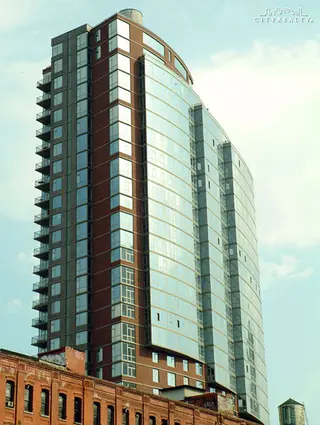
- Condo built in 2006
- 4 apartments currently for sale ($655K to $6.1M)
- Located in DUMBO
- 267 total apartments 267 total apartments
- 10 recent sales ($713.8K to $4.1M)
- Doorman
- Pets Allowed

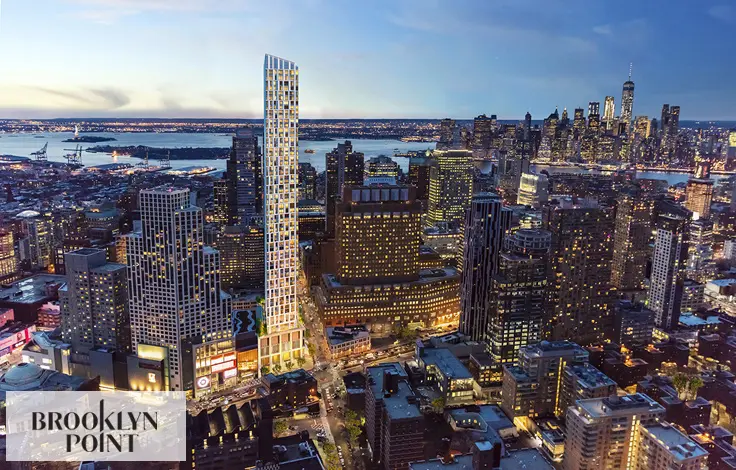
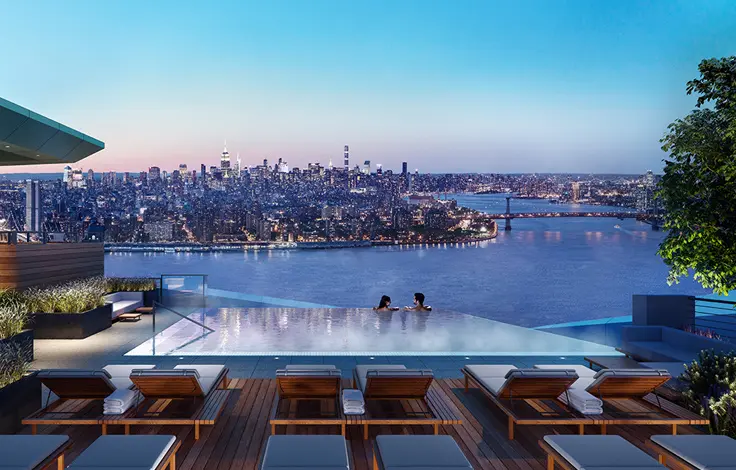
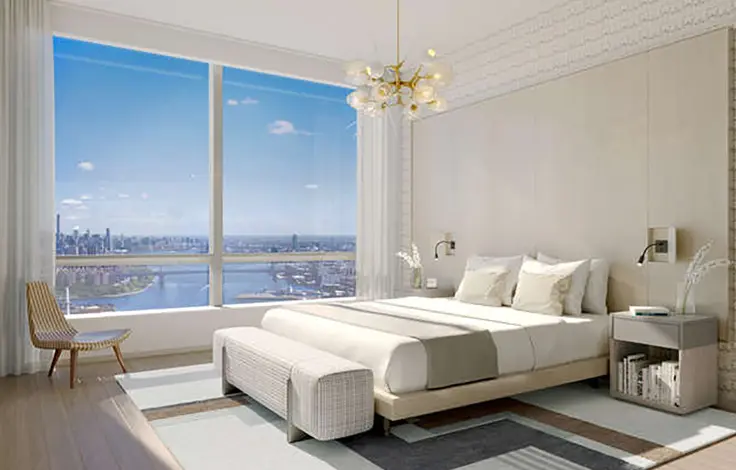
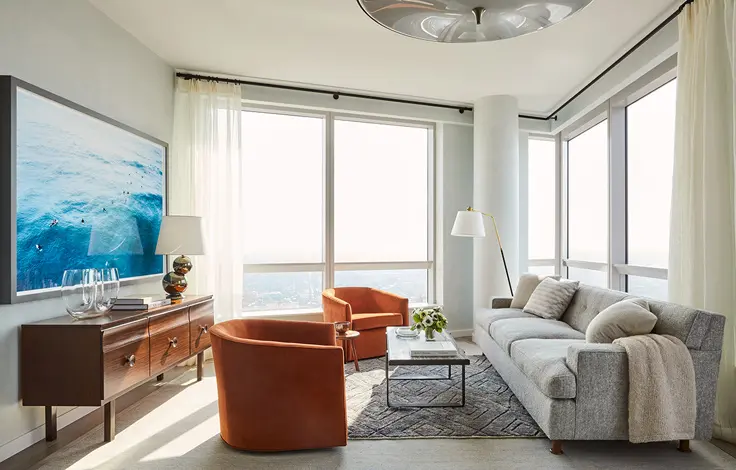
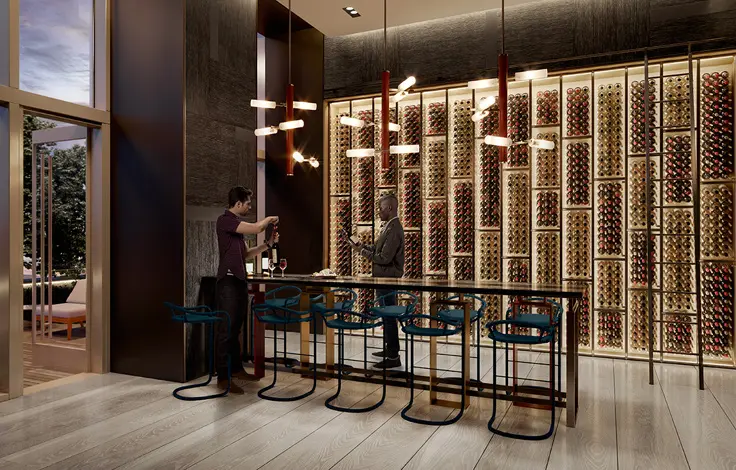
 6sqft delivers the latest on real estate, architecture, and design, straight from New York City.
6sqft delivers the latest on real estate, architecture, and design, straight from New York City.
